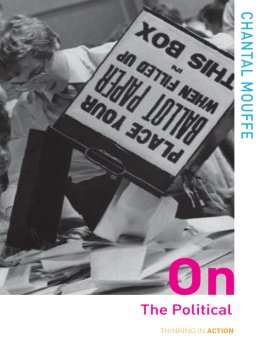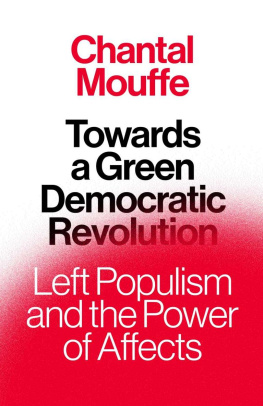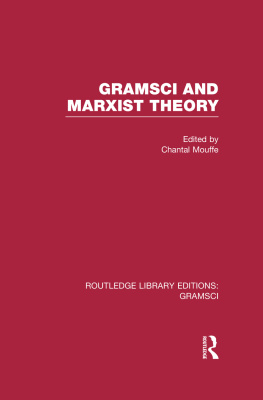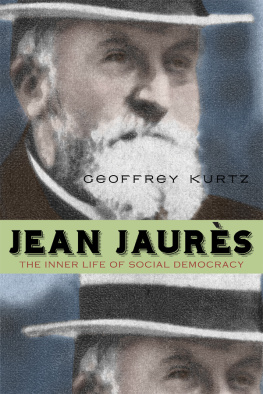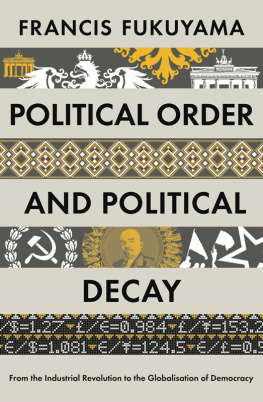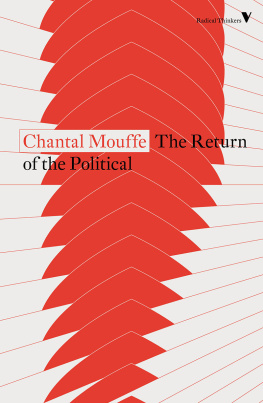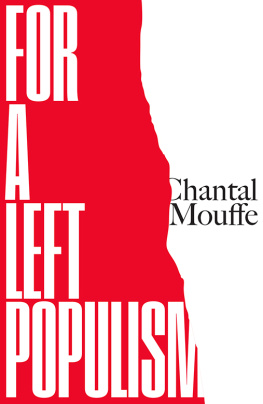On
the Political
Introduction
One
In this book I want to take issue with the view which informs the common sense in a majority of Western societies: the idea that the stage of economico-political development that we have now reached constitutes a great progress in the evolution of humanity and that we should celebrate the possibilities that it opens. Sociologists claim that we have entered a second modernity in which individuals liberated from collective ties can now dedicate themselves to cultivating a diversity of lifestyles, unhindered by antiquated attachments. The free world has triumphed over communism and, with the weakening of collective identities, a world without enemies is now possible. Partisan conflicts are a thing of the past and consensus can now be obtained through dialogue. Thanks to globalization and the universalization of liberal democracy, we can expect a cosmopolitan future bringing peace, prosperity and the implementation of human rights worldwide.
I want to challenge this post-political vision. My main target will be those in the progressive camp who accept this optimistic view of globalization and have become the advocates of a consensual form of democracy. Scrutinizing some of the fashionable theories which underpin the post-political Zeitgeist in a series of fields sociology, political theory and international relations I will argue that such an approach is profoundly mistaken and that, instead of contributing to a democratization of democracy, it is at the origin of many of the problems that democratic institutions are currently facing. Notions such as partisan-free democracy, dialogic democracy, cosmopolitan democracy, good governance, global civil society, cosmopolitan sovereignty, absolute democracy to quote only a few of the currently fashionable notions all partake of a common anti-political vision which refuses to acknowledge the antagonistic dimension constitutive of the political. Their aim is the establishment of a world beyond left and right, beyond hegemony, beyond sovereignty and beyond antagonism. Such a longing reveals a complete lack of understanding of what is at stake in democratic politics and of the dynamics of constitution of political identities and, as we will see, it contributes to exacerbating the antagonistic potential existing in society.
A significant part of my argument will consist in examining the consequences of the negation of antagonism in several areas, both in theory and in politics. It is my contention that envisaging the aim of democratic politics in terms of consensus and reconciliation is not only conceptually mistaken, it is also fraught with political dangers. The aspiration to a world where the we/they discrimination would have been overcome is based on flawed premises and those who share such a vision are bound to miss the real task facing democratic politics.
To be sure this blindness to antagonism is not new. Democratic theory has long been informed by the belief that the inner goodness and original innocence of human beings was a necessary condition for asserting the viability of democracy. An idealized view of human sociability, as being essentially moved by empathy and reciprocity, has generally provided the basis of modern democratic political thinking. Violence and hostility are seen as an archaic phenomenon, to be eliminated thanks to the progress of exchange and the establishment, through a social contract, of a transparent communication among rational participants. Those who challenged this optimistic view were automatically perceived as enemies of democracy. Few attempts have been made to elaborate the democratic project on an anthropology which acknowledges the ambivalent character of human sociability and the fact that reciprocity and hostility cannot be dissociated. And despite what we have learned through different disciplines, the optimistic anthropology is still prevalent today. For instance, more than half a century after Freuds death, the resistance to psychoanalysis in political theory is still very strong and its lessons about the ineradicability of antagonism have not yet been assimilated.
I contend that the belief in the possibility of a universal rational consensus has put democratic thinking on the wrong track. Instead of trying to design the institutions which, through supposedly impartial procedures, would reconcile all conflicting interests and values, the task for democratic theorists and politicians should be to envisage the creation of a vibrant agonistic public sphere of contestation where different hegemonic political projects can be confronted. This is, in my view, the sine qua non for an effective exercise of democracy. There is much talk today of dialogue and deliberation but what is the meaning of such words in the political field, if no real choice is at hand and if the participants in the discussion are not able to decide between clearly differentiated alternatives?
I have no doubt that the liberals who think that rational agreement can be reached in politics, and who see democratic institutions as the vehicle for finding the rational answer to the different problems of society, will accuse my conception of the political of being nihilistic. And so will those on the ultra-left who believe in the possibility of an absolute democracy. There is no point in trying to convince them that my agonistic approach is informed by the true understanding of the political. I will follow a different route. What I will do is bring to the fore the consequences for democratic politics of the denial of the political as I define it. I will reveal how the consensual approach, instead of creating the conditions for a reconciled society, leads to the emergence of antagonisms that an agonistic perspective, by providing those conflicts with a legitimate form of expression, would have managed to avoid. In that way I hope to demonstrate that acknowledging the ineradicability of the conflictual dimension in social life, far from undermining the democratic project, is the necessary condition for grasping the challenge to which democratic politics is confronted.
Because of the rationalism prevalent in liberal political discourse, it is often among conservative theorists that I have found crucial insights for an adequate understanding of the political. They can better shake our dogmatic assumptions than liberal apologists. This is why I have chosen to conduct my critique of liberal thought under the aegis of such a controversial thinker as Carl Schmitt. I am convinced that there is much that we can learn from him, as one of the most brilliant and intransigent opponents of liberalism. I am perfectly aware that, because of Schmitts compromise with nazism, such a choice might arouse hostility. Many people will find it rather perverse if not outright outrageous. Yet, I believe that it is the intellectual force of theorists, not their moral qualities, that should be the decisive criteria in deciding whether we need to establish a dialogue with their work.
I see the refusal of many democratic theorists to engage with Schmitts thought on moral grounds as typical of the moralistic tendency which is characteristic of the post-political Zeitgeist . In fact, the critique of such tendency is at the core of my reflection. A central thesis of this book is that, contrary to what post-political theorists want us to believe, what we are currently witnessing is not the disappearance of the political in its adversarial dimension but something different. What is happening is that nowadays the political is played out in the moral register . In other words, it still consists in a we/they discrimination, but the we/they, instead of being defined with political categories, is now established in moral terms. In place of a struggle between right and left we are faced with a struggle between right and wrong.

